More information

Thanks to having been awarded an Erwin Schrödinger Fellowship I was able to move to Los Angeles in November 2021 to work at the Center for Near Eastern Studies at the University of California, Los Angeles (UCLA) for two years. Established in 1957 by the Austrian historian Gustav von Grunebaum, the Center for Near Eastern Studies (CNES) is currently headed by Ali Behdad, a renowned expert on the history of photography in the Middle East. The CNES, which is connected to numerous similar centers in the “International Institute,” serves as a hub for exchanges between representatives from a wide range of disciplines. This trans-disciplinary approach made me feel very much at home there with my research on transimperial networks of photographic practices.
In my current project on the “Camera Caucasica” I am exploring the history of photography in the Caucasus in the “long 19th century.” My focus is on how photographs were produced, received, and exchanged across diverse (i.a. territorial, social, economic) borders, and who the important agents in these processes were. My research benefits greatly from the expertise I find here on Armenian networks and on (photographic) history in Iran.
In the course of my scientific career, I have been fortunate enough to enjoy numerous research spells abroad. Stays of several months took me to Georgia, Armenia, Azerbaijan, Russia, Croatia, Montenegro, Serbia, and Estonia, several times in some cases, and all of them were very beneficial for my work. And even though being an academic wanderer is not always easy in the postdoc phase, the Erwin Schrödinger Fellowship – with the freedom in the choice of host institution it offers – was a great opportunity for me to learn more about the academic culture of the United States. Starting from my academic home base – the Department of Southeast European History at the University of Graz, to which I will return after my fellowship in Los Angeles – the experience gained at CNES enables me to get a broader perspective on the history of (South) Eastern Europe. For future collaborative projects, I will be able to draw on an extensive network of colleagues between California and the Caucasus.
The fact that the Erwin Schrödinger Fellowship permitted me to freely devise my own work schedule was particularly important in the beginning, given the strict Covid rules at UCLA at the time. Thanks to distance learning, the campus was very quiet in the academic year 2021/22. Libraries and their special collections were open throughout, however, and the calm atmosphere was not exactly detrimental to the writing of my professorial qualification thesis. Los Angeles is also home to the Getty Research Institute and its extremely comprehensive visual collection, which represented a wonderful complement to the archival work I had already done in the Caucasus region (and beyond). By fall 2022, normality had returned to campus life. This allowed chance on-site encounters, but it also brought weeks of protests against the abuses that obviously exists here as elsewhere in the academic world.
Some things in Los Angeles take getting used to, such as earthquake safeguards on bookshelves or the mind-boggling importance cars have in this city. For an authentic LA experience, you can’t avoid taking a theoretical and practical driving test (the Austrian equivalent is nice to have, but doesn’t entitle you to drive a car for more than 10 days). And you want to be able to pitch in when people complain about the traffic jam on the Valley-bound 405 Freeway or some interchange.
At the same time, bicycles are not exactly a vital element of campus life (see photo) and my daily five-minute commute on two wheels was greeted by reactions between incredulity and concern by my colleagues. The Californian trinity (ocean-mountains-desert) makes every weekend trip a highlight and I will miss the mild winter. The degree to which (former) students and their relatives feel attached to this university, especially in the Westwood district, is also unusual and somewhat intriguing to me. But in a way it’s infectious, particularly if you’re a sports fan like me. So: Go Bruins!